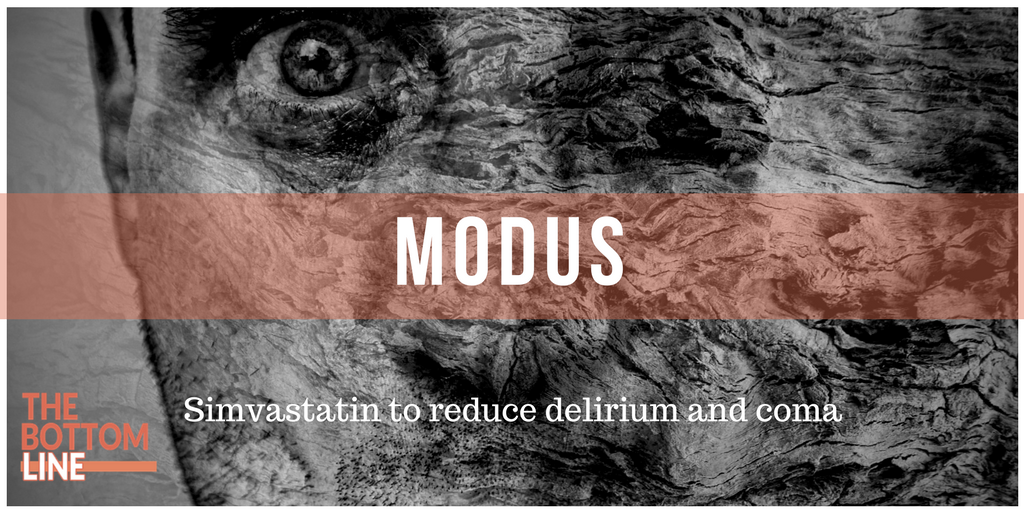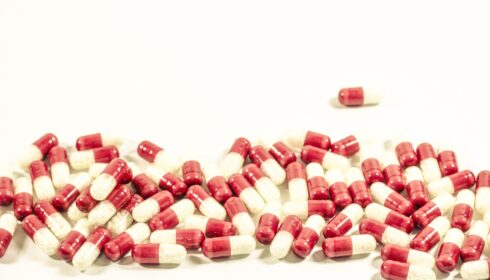MoDUS

Evaluation of early administration of simvastatin in the prevention and treatment of delirium in critically ill patients undergoing mechanical ventilation
Page. Lancet Respir Med 2017; 5: 727. doi:10.1016/S2213-2600(17)30234-5
Clinical Question
- In mechanically ventilated patients, does the early administration of simvastatin compared to placebo reduce the incidence of brain dysfunction (delirium and / or coma)?
Background
- Delirium has been defined as a clinical syndrome of acute brain dysfunction
- It is common, with up to 80% of critically ill and mechanically ventilated patients suffering from delirium during their hospital stay, and it is associated with increased resource use and worse patient-related outcomes
- No pharmacological agent has been shown to be effective at preventing or reducing delirium, although many are administered to control hyperactive delirium when it prevents the delivery of care – haloperidol, olanzapine, midazolam, clonidine, propofol, opioids to name just a few
- The high concentrations of pro-inflammatory cytokines within CSF samples during critical illness has led to the postulation that anti-inflammatory drugs such as statins may reduce cognitive dysfunction – a theory supported by animal experiments and human observational studies
Design
- Single-centre, randomised, controlled trial
- Randomisation sequence was generated in advance by a trial statistician
- 1:1 allocation
- Variable block sizes of 2, 4, 6 and 8 without stratification for any known variables
- Sequential and identical drug packs were prepared by an offsite, independent pharmaceutical using the randomisation sequence, such that allocation was concealed adequately
- Placebo and active drug were identical, such that healthcare professionals and patients were blinded to allocation, but trial statisticians were aware of allocation
- Power calculation based upon data from ABC trial and BRAIN-ICU trial
- Powered to detect difference of 2 delirium-free and coma-free days (between day 0 and 14)
- Significance defined as 0.05 (5% chance of false positive conclusion)
- Power set at 80% (20% chance of false negative conclusion)
- Allowing for 10% loss to follow-up, target sample size was 142
- Intention-to-treat analysis
- Trial design and statistical plan was published in advance
- The trial was granted ethical approval by a national research ethics committee and the Medicines and Healthcare products Regulatory Agency (MHRA)
- No funding came from corporate sponsors or pharmaceutical firms
- Clinical definitions for outcomes were well validated assessment tools
- Coma was defined as Richmond Agitation Sedation Scale score -3 to -5, assessed 4-hourly
- Delirium was defined as CAM-ICU positive (or Not Able To Assess if coma present), assessed twice per 12 hour nursing shift
- Any one positive assessment for coma or delirium classified that calendar day as not coma-free or delirium-free
Setting
- Single centre, UK NHS hospital
- February 2013 to July 2016
Population
- Inclusion: invasive mechanical ventilation within first 72 hours of Critical Care admission
- Exclusion: under 18 years old; pregnancy or breast-feeding; allergy to statin; recent administration of statins; clinical indication for statins; co-medication with interacting drug; severe deranged liver or renal disease; predicted short stay or routine post-operative care
- 1164 screened, 142 randomised and included in the primary outcome analysis
- The two groups were comparably similar in all measured variables (Simvastatin vs Placebo)
- Mean age: 62 years vs 62 years
- Sepsis, ARDS or both: 32% vs 25%
- Mean SOFA score: 8.8 vs 8.9
Intervention
- Simvastatin
- 80mg Simvastatin daily
- Administered as soon as possible after randomisation, and midday each day thereafter
- Administered via oral or nasogastric route
- Mean days on drug: 7.9 (SD 6.6)
Control
- Placebo
- No details of placebo ingredients
- Administered as soon as possible after randomisation, and midday each day thereafter
- Administered via oral or nasogastric route
- Mean days on drug: 10.1 (SD 7.8)
Management common to both groups
- Discontinuation of the study drug occurred in any of the following situations
- ICU discharge (54%)
- Withdrawal of life-supporting treatment (15%)
- CK > 10x upper limit of normal (8%)
- 8 cases in Simvastatin group vs 3 cases in Placebo group (P = 0.21)
- Day 28 in trial on ICU (7%)
- Death (6%)
- These were censored as 0 days delirium-free to avoid a ‘delirium-free death’ being analysed as a good outcome
- Discontinuation requested by clinician, patient or legal representative (6%)
- ALT > 8x upper limit of normal (4%)
- Specific indication for, or contraindication against, statin therapy (0%)
Outcome
- Primary outcome: There was no statistical or clinically meaningful difference in the delirium-free and coma-free days between the two groups
- Simvastatin group: mean 5.7 days
- Placebo group: mean 6.1 days
- Mean difference: 0.4 days (95% CI -1.3 to 2.1)
- P = 0.66 (unpaired 2 sample t test)
- Given the non-normal distribution, analyses using bootstrapping and joint modelling were conducted, which agreed with the crude t test analysis
- Secondary outcome: None of the following secondary outcome demonstrated any statistical or clinically meaningful difference
- Delirium-free and coma-free days to Day 28
- Incidence of any delirium (Simvastatin 93% vs Placebo 94%)
- Ventilator-free days to Day 28
- Organ-failure-free days to Day 28
- All-cause mortality at 6 months (Simvastatin 42% vs Placebo 31%)
- Median length of hospital stay (Simvastatin 16 days vs Placebo 18 days)
- IQCODE difference from baseline to 6 months (a measure of cognitive decline)
Authors’ Conclusions
- Early administration of simvastatin to a cohort of critically ill patients that required invasive mechanical ventilation did not decrease the number of days these patients were free from coma or delirium
Strengths
- Well constructed experimental Phase 2 trial
- Good internal validity of the results
- Appropriate randomisation method, concealment of allocation, blinding and maintenance, which all minimise potential bias
- No imbalance in baseline variables
- Use of validated assessment tools by blinded nursing staff
- Appropriate statistical analysis including intention-to-treat and complete follow-up for the primary outcome
- Recruited target number of patients, such that power calculation likely to be valid (i.e. 20% chance of false negative conclusion)
- Reasonable potential to generalise results to other populations, but see comment in weaknesses
- Inclusion / exclusion aimed to identify cohort at high-risk of developing delirium
Weaknesses
- Limitations to how the results can be extrapolated to other populations
- Non-English speaking patients excluded due to difficulty obtaining informed consent, such that cohort is probably dominated by white caucasian (but ethnicity not reported)
- Those with renal / liver disease were excluded
- Single-centre design, so findings may not be reproduced if tested in other settings
- (In my opinion) The biological plausibility is doubtful and the short duration of therapy and follow-up weakens the conclusion
- Although administered as early as possible in this trial, it would seem unlikely that the inflammatory trigger (which may be a contributory factor in the cognitive dysfunction) can be modulated by a once daily dose of simvastatin administered after the critical illness has become established
- Given the relatively short duration of administration (mean ~ 8 days), it may be that insufficient therapy was delivered to have clinically meaningful response
The Bottom Line
- This well designed and conducted trial demonstrates that there is no benefit from administering 80mg simvastatin with the first few days of a severe critical illness to prevent or treat early delirium
- Despite the strengths of the methodology, the doubtful plausibility of the hypothesis tested and the short duration of therapy means this trial may not have truly proven the theory is wrong, and further studies with different regimes or in different populations may be warranted
External Links
- [article] Evaluation of early administration of simvastatin in the prevention and treatment of delirium in critically ill patients undergoing mechanical ventilation
- [further reading] Delirium by LITFL
- [YouTube] Performing a CAM-ICU assessment by Valerie Page
Metadata
Summary author: Duncan Chambler
Summary date: 7 December 2017
Peer-review editor: Adrian Wong




Excellent website
Great analysis